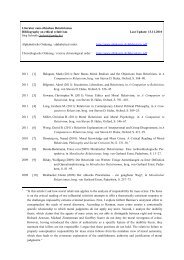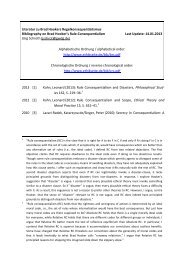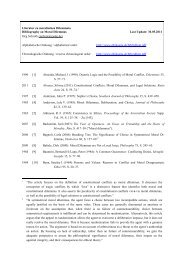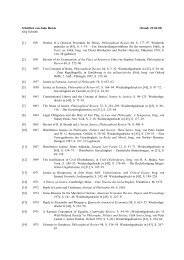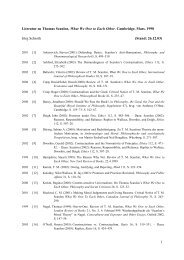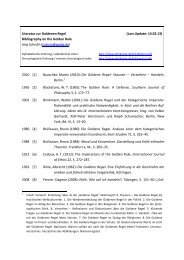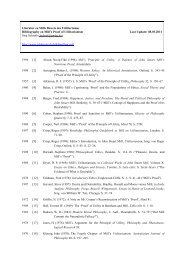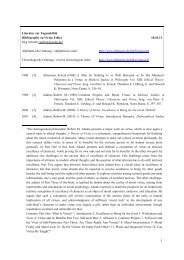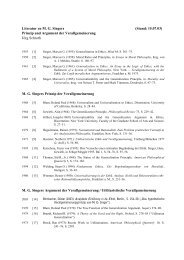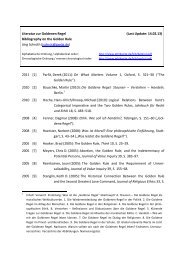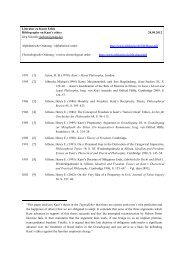Chronologische - Ethikseite
Chronologische - Ethikseite
Chronologische - Ethikseite
Create successful ePaper yourself
Turn your PDF publications into a flip-book with our unique Google optimized e-Paper software.
Moraltheorie, Frankfurt a.M., Berlin, Bern u.a. 133<br />
2002 [578] Staege, Roswitha (2002): Hypothetische Imperative, Kant-Studien 93, S. 42–56.<br />
2002 [579] Steigleder, Klaus (2002): Kant, in Handbuch Ethik, hrsg. von Marcus Düwell, Christoph<br />
Hübenthal und Micha H.Werner, Stuttgart, Weimar, S. 128–139.<br />
2002 [580] Steigleder, Klaus (2002): Kants Moralphilosophie. Die Selbstbezüglichkeit reiner praktischer<br />
Vernunft, Stuttgart, Weimar.<br />
2002 [581] Stohr, Karen E. (2002): Virtue Ethics and Kant’s Cold-Hearted Benefactor, Journal of Value<br />
Inquiry 36, S. 187–204.<br />
2002 [582] Tannenbaum, Julie (2002): Acting with Feeling from Duty, Ethical Theory and Moral Practice<br />
5, S. 321–337. 134<br />
2002 [583] Timmons, Mark (2002): Moral Theory. An Introduction, Lanham, S. 151–87 (“Kant’s Moral<br />
Theory”).<br />
2002 [584] Timmons, Mark (2002): Motive and Rightness in Kant’s Ethical System, in Kant’s<br />
Metaphysics of Morals. Interpretative Essays, hrsg. von Mark Timmons, Oxford, S.<br />
255–88.<br />
2002 [585] Timmons, Mark (Hrsg.) (2002): Kant’s Metaphysics of Morals. Interpretative Essays, Oxford.<br />
2002 [586] Watkins, Eric/Fitzpatrick, William (2002): O’Neill and Korsgaard on the Construction of<br />
Normativity, Journal of Value Inquiry 36, S. 349–67. – Vgl. dazu [316].<br />
2002 [587] Westphal, Kenneth R. (2002): A Kantian Justification of Possession, in Kant’s Metaphysics of<br />
Morals. Interpretative Essays, hrsg. von Mark Timmons, Oxford, S. 89–110.<br />
2002 [588] Willaschek, Marcus (2002): Which Imperatives of Right? On the Non-Prescriptive Character<br />
of Juridical Laws in Kant’s Metaphysics of Morals, in Kant’s Metaphysics of Morals.<br />
Interpretative Essays, hrsg. von Mark Timmons, Oxford, S. 65–88.<br />
2002 [589] Wood, Allen W. (2002): The Final Form of Kant’s Practical Philosophy, in Kant’s<br />
Metaphysics of Morals. Interpretative Essays, hrsg. von Mark Timmons, Oxford, S.<br />
133 „Die kantische Ethik steht im Spannungsfeld von Rationalismus und Unmittelbarkeit, welche von der Vernunft<br />
nicht mehr zu fassen ist. Es ist das Faszinierende an der Theorie Kants, dass Moralität als<br />
vernünftiges Phänomen erkannt wird, welches intersubjektive Geltung beanspruchen muss. Gleichwohl<br />
kommt praktische Vernunft im Begriff des Gewissens in einen rational nicht mehr einholbaren Bereich.<br />
Inhalt: Die kantische Freiheitstheorie – Das Problem der praktischen Vernunft – Der kategorische Imperativ<br />
– Das Gewissen.“<br />
134 “A central claim in Kantian ethics is that an agent is properly morally motivated just in case she acts from<br />
duty alone. Bernard Williams, Michael Stocker, and Justin Oakley claim that certain emotionally infused<br />
actions, such as lending a compassionate helping hand, can only be done from compassion and not from<br />
duty. I argue that these critics have overlooked a distinction between an action’s manner, how an action is<br />
done, and its motive, the agent’s reason for acting. Through a range of examples I demonstrate how an<br />
emotion can determine an action’s manner without also serving as the motive. Thus, it is possible for an<br />
agent to act compassionately from duty alone. This distinction between the manner and the motive of an<br />
action not only restores a central claim in Kantian ethics but it also allows for an expanded role of emotions<br />
in moral action.”



